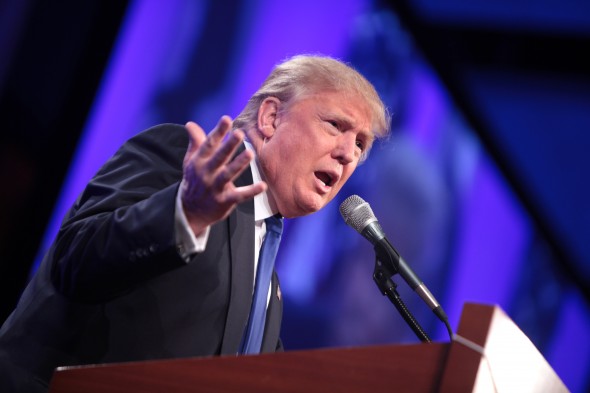This past Saturday, I went to one of my county’s early-voting polling places to cast my ballot in the Maryland Republican primaries. As I approached the polling place, I noticed an astounding number of signs for presidential, senatorial and Board of Education candidates. Virtually every name from both major parties was plastered on small signs spanning the size of a football field.
Perhaps unsurprisingly, “Trump” signs were the most noticeable, if only because there were seemingly hundreds of them. What was more surprising was that there was a Donald Trump tent and table set up not too far from the side entrance of the library polling place. Besides a few friendly, local, nonpartisan Board of Education surrogates waving signs, this Trump tent was the only campaign presence at the polling place. It was very unusual for a Howard County presidential year primary (with no state government elections).
Being curious — or more accurately, looking for a debate — I made sure to walk by the tent on the way to vote. Sure enough, a small group of Trump supporters emerged, led by a woman decked out in Trump gear.
As I looked over, she called out and asked, “Are you voting for Mr. Trump?” to which I politely replied, “No, sorry, I’m a conservative.” Crestfallen, she asked if I supported Sen. Ted Cruz, to which I again responded in the negative.
At that, she seemed confused, but determined to persuade me, she proceeded to claim that he was the only candidate who could beat a Democrat in November and said “Don’t you want to make America great again?”
I countered with the polling data that shows Trump getting absolutely crushed by Democratic candidates Hillary Clinton or Bernie Sanders. Her response was to repeat Trump: He hasn’t even started on Hillary yet! She was marginally happier when I told her I was voting for Gov. John Kasich, even asking if I had been at his rally in Howard County (that she had protested).
She then inquired why I wasn’t voting for Trump. Trying to test her, I reminded her that I was a younger, more libertarian-leaning conservative — so why would I vote for a candidate I don’t trust?
So she began to talk about his policies, like “We’re going to build that wall and make Mexico pay for it” and “He’ll bring jobs back to America.” She told me about how he would expose cronyism in politics and in legislation by shaking up Washington. She related her anger with the government feeling unresponsive, massive federal debt and how the government is handling ISIS.
I mostly listened, occasionally commenting with a point or two. The one interesting thing was how often she quoted him exactly in arguments, using his favorite phrases. A more frightening aspect was how much reverence she spoke with when describing his values or himself directly. If he asked his supporters to rally at the Republican convention in July, she’d be there in a heartbeat.
Instead of disagreeing with a lot of her policy points or his controversial nature, I asked her how we could trust him to implement changes to immigration and trade that would hurt his business assets and strategy, especially because his sons would be managing his assets. Furthermore, I told her he donated to Democrats heavily before 2011, so he was a special interest running for president directly.
At this, she fell silent for a few moments. She mentioned that he could have retired to the Caribbean and that he was doing this for America, to which I reminded her that it was too far from the spotlight — and he could have “been doing this for America his whole life if he wanted.”
Running late already, we parted ways and I headed into the polling place, better for the experience. The supporter was enthusiastic and civil — even though we disagreed on several issues — which can only help political involvement and engagement. It allowed me to humanize Trump supporters, something which the media and many at this university had discouraged me from doing. I’m still #NeverTrump, but I can understand why some of his supporters believe in him. These people feel left out of the modern economy and political system. They’re upset with cronyism, absence of rule of law and the federal government. Many of us can sympathize with some or all of these feelings, even if we don’t or won’t support Trump.
Fundamentally, though, she was unpersuasive and shallow in her defense of her candidate. She literally parroted Trump’s major slogans on multiple occasions when I tried to discuss policy and was silenced when I asked why Trump would change immigration and trade policies that help his businesses. Facts were ignored and common sense was lacking. But most strikingly, we disagreed on the idea of a globalized world, individual rights and the priorities of government.
I embraced globalization; she wanted to reverse it. I supported individual rights; she prioritized strong “safety and security” over the rights she was concerned about. I cared about a strong, competitive economy, small government, individual rights and foreign defense. She cared about immigration, protectionist trade policy and traditional values. It was the generational difference in the Republican Party that is similar to the generational divide seen between supporters of Clinton and Sanders.
As I walked out of the polling place, I realized just how much new generations are affecting parties, politics and the nation’s future. My vote for Senate was for Chrys Kefalas, a conservative small business owner who has worked for former Obama administration Attorney General Eric Holder on criminal justice reform and just happens to also be a gay Republican with immigrant grandparents.
Times are changing.
Matt Dragonette, opinion editor, is a senior accounting and government and politics major. He can be reached at mdragonettedbk@gmail.com.



